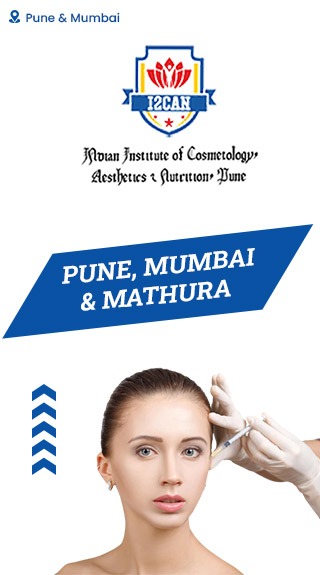Introduction:
Our skin and hair are reflections of our overall health and well-being. While we often turn to external products and treatments for radiant skin and lustrous hair, the key to unlocking their true potential lies within our diet. In this blog, we will explore the profound impact of diet on skin and hair condition. Furthermore, we will uncover how the Indian Institute of Cosmetology Aesthetics and Nutrition (IICAN) can provide valuable insights through their Diet and Skin Wellness Management course.
Section 1: The Connection Between Diet and Skin Health
1.1 The Role of Nutrients: Our skin is nourished by a variety of nutrients that support its health and vitality. Vitamins like A, C, and E provide antioxidants that protect the skin from damage caused by free radicals. Minerals such as zinc and selenium help maintain the skin’s integrity and support collagen production. Omega-3 fatty acids, found in foods like fatty fish and flaxseeds, promote skin hydration and reduce inflammation. By incorporating a balanced diet rich in these nutrients, you can enhance your skin’s natural radiance.
1.2 Managing Inflammation: Inflammation is a common underlying factor in many skin conditions, including acne, eczema, and psoriasis. Certain dietary choices can either exacerbate or reduce inflammation in the body. Foods high in sugar, processed carbohydrates, and unhealthy fats can promote inflammation, while a diet rich in fruits, vegetables, whole grains, and healthy fats has an anti-inflammatory effect. By adopting an anti-inflammatory diet, you can support healthier skin and reduce the risk of inflammatory skin conditions.
Section 2: Nourishing Your Hair from Within
2.1 Essential Nutrients for Hair Growth: Strong and luscious hair requires adequate nourishment. Biotin, often referred to as the “hair vitamin,” plays a vital role in hair growth and strength. Foods like eggs, nuts, and whole grains are excellent sources of biotin. Iron is another crucial nutrient for healthy hair, as it helps deliver oxygen to the hair follicles. Including iron-rich foods like lean meats, spinach, and lentils in your diet can support optimal hair growth. Additionally, zinc and omega-3 fatty acids contribute to scalp health and reduce hair loss.
2.2 Protein Power: Protein is the building block of hair, and a deficiency can lead to weak, brittle hair. Consuming adequate protein from sources such as lean meats, poultry, fish, beans, and lentils helps provide the necessary amino acids for hair growth and repair. Additionally, protein-rich foods contain essential vitamins and minerals that support overall hair health.
Section 3: Dietary Factors and Skin/Hair Conditions
3.1 Acne and Diet: The relationship between diet and acne has been a topic of interest in recent research. High-glycemic foods, which rapidly raise blood sugar levels, have been linked to increased acne breakouts. Dairy products and foods high in saturated fats may also contribute to acne development. On the other hand, a diet rich in fruits, vegetables, whole grains, and lean proteins has been associated with clearer skin. By making dietary modifications and reducing the intake of acne-triggering foods, you can support a clearer complexion.
3.2 Eczema and Psoriasis: While diet alone cannot cure eczema and psoriasis, certain dietary factors may influence symptom severity. Some individuals with eczema may experience flare-ups triggered by food allergens, such as dairy, gluten, or nuts. For psoriasis, an anti-inflammatory diet rich in fruits, vegetables, and omega-3 fatty acids may help reduce inflammation and alleviate symptoms. It’s important to work with a healthcare professional to identify any specific dietary triggers and develop a personalized approach to managing these conditions.
Section 4: IICAN’s Diet and Skin Wellness Management Course
Course Overview: The Diet and Skin Wellness Management (DSWM) course offered by the Indian Institute of Cosmetology Aesthetics and Nutrition (IICAN) is designed to provide comprehensive knowledge on the relationship between diet and skin health. The course covers topics such as understanding skin structure, analyzing common skin conditions, and implementing dietary interventions to support skin wellness.
Course Benefits: By enrolling in the DSWM course at IICAN, you will gain in-depth knowledge about the impact of diet on skin and hair condition. You will learn how to assess individual dietary needs, develop customized diet plans, and recommend appropriate nutritional interventions for various skin and hair concerns. The course combines theoretical knowledge with practical training, equipping you with the skills to make a positive impact on the skin and hair health of your clients.
Career Opportunities: Completing the DSWM course opens up a range of career opportunities in the field of nutrition and skincare. You can work as a diet consultant specializing in skin wellness, collaborate with dermatologists and skincare professionals, or even start your own practice. With the growing demand for holistic approaches to skincare, the knowledge and skills gained from the DSWM course can position you as a valuable asset in the industry.
Summary : The connection between diet and skin/hair condition is undeniable. By adopting a nutrient-rich diet, managing inflammation, and identifying dietary triggers for specific conditions, you can support healthier skin and hair from within. With the comprehensive Diet and Skin Wellness Management course offered by IICAN, you can further enhance your expertise in this field and explore rewarding career opportunities in the intersection of nutrition and skincare.


